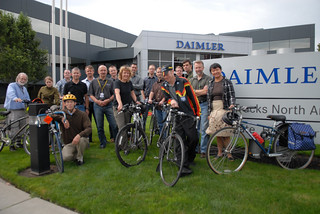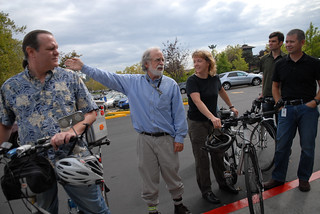
development on Wednesday.
(Photos © J. Maus/BikePortland
The issue of bicycling on and around Swan Island is enjoying a major surge lately and it could take center stage during a debate on Wednesday between mayoral hopefuls Jefferson Smith and Charlie Hales. The topic of the debate is “the city’s role in economic development.” But if you think that means bicycling won’t merit a mention; think again.
First, the debate will be held at Daimler Trucks North America, which is not only one of the economic and employment powerhouses on Swan Island, it also happens to be home to a growing and active nucleus of dedicated bike commuters.
DTNA’s 200 or so regular bike commuters (according to the Portland Mercury) have become catalysts for biking on Swan Island. During the most recent BTA Bike Commute Challenge, the DTNA team logged 22,001 miles in bike trips. That’s almost twice their total mileage from just two years ago.
Another reason it’s likely biking will play a role in the debate is because it will be moderated by none other than Lenny Anderson. While he’s currently the executive director of the Swan Island Business Association, Lenny is also known as one of the most vocal and passionate bicycling and transportation activists in Portland. During his tenure at the Swan Island Transportation Management Association, he lobbied for projects large (Going to the River, the Waud Bluff Trail) and small (several bits of new sidewalks). (Note: Lenny’s replacement at the TMA, Sarah Angell, has kicked bike promotion up a notch and has several exciting initiatives afoot.)
Anderson is keenly aware that in order to keep Swan Island attractive to the best employees and efficient as possible for businesses, it must have better bike access. As more people bike to work, output and productive will improve, semi-trucks will have less congestion to hold them up, and — with less space occupied by parked cars — companies will have more room to build R & D labs, inventory warehouses, and other key drivers of economic development.
Anderson is also helping lead a renewed charge to encourage the City of Portland to negotiate with railroad operators to grant public access to the Ash Grove Cement Road. That road could be a flat and direct, north-south connection between Swan Island and downtown Portland; but it’s technically private property. Portland Parks & Recreation spurred a backlash from Anderson and others when they avoided the route in their proposed alignment of the North Willamette Greenway Trail, in favor of routing bicycle traffic up on to busy and narrow surface streets.
(Read more about this in the current issue of the Portland Mercury)
The industrial center of Swan Island is just a stone’s throw from downtown Portland and it’s home to 10,000 jobs. Its high-speed streets full of huge semi-trucks, poor connections to nearby neighborhoods, and general lack of quality bike access has always meant only the very strong and fearless would ever consider commuting by bike. But — thanks to some dedicated riders, citizen activists, and professional advocates — that’s starting to change.
Portland’s next mayor will oversee a new era of bicycling — and potentially an economic renaissance — on Swan Island. This debate will be both candidates’ first chance to explain to voters how transportation can play a role.
——
-
Mayoral Debate on Swan Island: The City’s Role in Economic Development
Wednesday, October 10th, 8:00 am to 10:00 am
Hosted by the Swan Island Business Association
Daimler Trucks North America’s Corporate Conference Center (Corp 8 building, 4555 N. Channel Ave)
Free: 500 seat capacity so arrive early for a good seat


